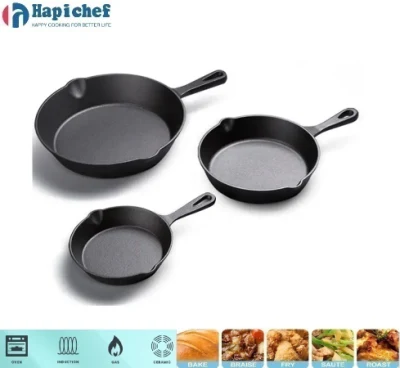Exploring the Manufacturing Process and Quality of Cast Iron Pans in Modern Factories
The Fascinating World of Cast Iron Pan Factories
Cast iron pans are more than just kitchen tools; they are a staple in culinary traditions across the globe. Renowned for their durability, excellent heat retention, and versatility, these pans are made by a process that dates back centuries. The factories that produce cast iron pans play a crucial role in preserving this age-old craft while meeting modern demands.
The Manufacturing Process
The journey of a cast iron pan begins with the selection of raw materials, primarily pig iron and scrap iron. These materials are melted in a furnace at extremely high temperatures, usually exceeding 1,400 degrees Celsius. Once the iron has melted, it’s poured into molds that are often made from sand. This molding process can vary depending on the manufacturer, with some opting for hand-crafted molds which add unique characteristics to each piece.
After the molten iron cools and solidifies, the pan is removed from the mold and undergoes additional processes like grinding and polishing to refine the cooking surface. Factories often employ skilled artisans who ensure that each pan meets rigorous quality standards. The final steps involve seasoning the pan, where a layer of oil is baked onto the surface to create a non-stick finish and prevent rust. This step is essential, as it enhances the pan's performance and longevity.
The Role of Modern Technology
While traditional methods still play a significant role in the production of cast iron pans, modern technology has made its way into these factories. Automation is increasingly used in the melting and molding processes, improving efficiency and allowing factories to scale up production without sacrificing quality. Advanced temperature control systems ensure that the metal reaches optimal melting points, contributing to a more consistent product.
However, many factories pride themselves on blending technology with craftsmanship. Skilled workers and modern machines often work hand in hand, ensuring that the intrinsic qualities of cast iron cookware are preserved while also meeting the rising consumer demand. This fusion of old and new allows manufacturers to produce high-quality pans that can compete in both local and international markets.
a cast iron pan factories

Environmental Considerations
As awareness of environmental sustainability continues to grow, cast iron pan factories are reevaluating their practices to lessen their impact on the planet. Many are investing in eco-friendly technologies and processes, notably in the recycling of scrap iron. By using recycled materials, factories not only reduce their carbon footprint but also contribute to a circular economy. Furthermore, some manufacturers are exploring greener methods of seasoning, opting for plant-based oils instead of traditional petroleum-based options.
The Global Market
The demand for cast iron cookware has seen a resurgence in recent years, thanks in part to the rising interest in home cooking and traditional culinary techniques. Consumers are increasingly seeking out cast iron pans for their versatility; they can go from stovetop to oven, and they’re perfect for various cooking methods, including searing, baking, and frying.
The global market for cast iron cookware is becoming more competitive, with manufacturers from different countries introducing their unique designs and features. For instance, some factories in the United States focus on heavy-duty, traditional pans, while others in Europe may prioritize aesthetic and modern designs. This diversity enriches the market and provides consumers with a plethora of choices.
Conclusion
Cast iron pan factories are at the heart of a time-honored tradition that continues to evolve. By combining traditional craftsmanship with modern technology and sustainable practices, these factories ensure that cast iron pans remain a beloved kitchen staple for generations to come. As they adapt to the changing demands of consumers and prioritize environmental responsibility, the future of cast iron cookware remains bright, promising delicious meals and cherished cooking experiences worldwide.
-
Why Every Home Cook Needs a Cast Iron Meat PressNewsNov.12,2024
-
Unlock Perfectly Seared Steaks with the Cast Iron Meat PressNewsNov.12,2024
-
Master the Art of Cooking Thick Cuts of Meat with a Cast Iron Meat PressNewsNov.12,2024
-
How to Care for Your Cast Iron Meat Press: Tips for Longevity and PerformanceNewsNov.12,2024
-
How a Cast Iron Meat Press Enhances the Flavor and Texture of Your BurgersNewsNov.12,2024
-
Roasting Pan for Perfect MealsNewsNov.04,2024
-
Perfect Skillet for SaleNewsNov.04,2024
